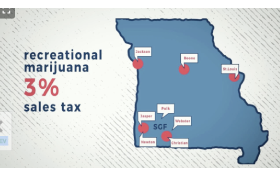(The Center Square) – Springfield voters on Tuesday approved a 3% sales tax on recreational marijuana in the state’s third-largest city by a wide margin.
The tax, the only item on Tuesday’s ballot, is estimated to generate approximately $1.8 million per year. Unofficial returns from the Greene County Clerk’s Office, which administers elections in the county seat of Springfield, reported 5,995 ballots were cast, or 5.63% of Springfield residents, according to Clerk Shane Schoeller. The measure passed with 69.82% or 4,186 votes.
“It was a little lower than normal,” Schoeller said of the turnout in an interview with The Center Square. “I contribute that to the fact there wasn’t a strong advocacy campaign. So, there wasn’t necessarily a lot of voter awareness on the issue.”
State law requires cities like Springfield to pay Greene County for ballot initiatives.
“I think the ballpark guess we sent them was about $250,000,” Schoeller said. “That will be finalized after everything is completed and certified.”
Missouri voters legalized recreational marijuana last November with a constitutional amendment. The state sales tax on recreational marijuana is 6%. The tax doesn’t apply to medical marijuana.
Currently, the sales tax rate within the Springfield city limits is 8.1%, with 4.23% going to the state, 1.75% to Greene County and 2.13% to Springfield. When Springfield’s recreational marijuana tax becomes effective on Jan. 21, 2024, the 9% tax will be added to the city’s current tax rate for all retail goods, bringing the total tax rate on recreational marijuana purchases to 17.1%.
“We are very grateful for the support of the community with this passage,” Springfield Mayor Ken McClure said in a statement.
The additional tax revenue will be used for public safety, mental health services and housing and substance abuse services, according to a media release from the City of Springfield. The city council will allocate funds through the budget process.
“They could spend all funds in one program, divide them evenly or take a more customized approach,” City Manager Jason Gage said in a statement. “If they should focus on long-term programming using the funds, then it is possible they will prepare a longer-term funding plan similar to our capital improvement program.”
Other large cities and counties in the state – St. Louis, St. Louis County, Kansas City, Jackson County, Columbia and Boone County – passed sales taxes on recreational marijuana in April and are expected to begin collecting taxes in October. However, a lawsuit is challenging whether the taxes can be “stacked.” Counties collecting the 3% tax and municipalities also collecting a 3% tax would bring the local tax total to 6%, matching the state tax amount.
https://www.thecentersquare.com/missouri/article_2c6b3946-36e0-11ee-946f-732a1cb891a5.html




















